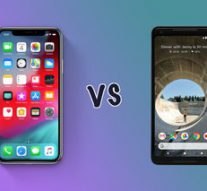
Android vs. iPhone
Lifestyle & Opinion October 18, 2019By Gabriel Garver
One of the biggest ongoing debates is Android vs. iPhone. The reason that this is such a big debate is mostly because there is no other phone that stands a chance. In fact, iPhones and Androids made up 99.7% of the smartphones that were shipped in 2017 (Hill). However, even though there are only two major types of phones, it is still important to pick and use the right one. The four major things to consider when deciding what phone is right for you is price, security, ease of use, and customizability.
iPhone is well known for being an expensive phone; for example, the new iPhone costs $1,450 because it’s a high-quality, name-brand phone. Android, on the other hand, has a huge variety of products. Consequently, there’s also a huge range of prices, ranging from $1,400 for a high-quality phone, all the way to $150 for a low quality but extremely cost-effective phone, which is far less than any new iPhone.
Even though Androids are better in terms of pricing, iPhones excel at security. This is partly due to the fact that iPhones use the latest update as opposed to Androids. As of September 2019, 87% of iPhones use version iOS 12, but only 10.4% of Androids use the version Android Pie 9.0 (Hill). Most Androids are not up to date, and because of that, they have less security features than an iPhone does. In addition, iPhones encrypt, which means to conceal data by converting into a code, all user data (LEXICO). However, Android only encrypts some user data, making it less protected (Hill). So, if you want to use Android, you’ll have to be more careful while using it.
iPhones tend to be more user friendly than Androids. One factor is that the screen layout looks the same no matter which specific mobile device you get. Unfortunately, most Androids have slightly different screen layouts depending on the manufacturer (Hill). iPhone is also a little smoother in terms of user experience, and a bit easier to find your way around.
So, after considering price, security, and ease of use, the last major thing to think about is customizability. iPhones are easier to find accessories for, such as cases; however, the average iPhone user usually spends more money on accessories than an Android user does (Hill). In terms of customizability within the phone, Android does it better. Android phones even allow you to download custom apps off the internet if you want to. Androids also have easier-to-use widgets that you can place on your home screen to quickly check information from certain apps, like the weather or sport scores. So overall, iPhone has more customization options for the phone itself, but Android has more software customizations that you could make.
Taking all the pros and cons into consideration, the phone that works for you might be different, but I feel that Android is a better phone overall. Even though iPhone is slightly better at security and ease of use, Android’s customizability and price is something the iPhone does not offer. So, if you use caution when downloading things and you get acclimated to the layout of the phone, Android will not pose more risks than an iPhone would.
Header photo from techadvisor.





